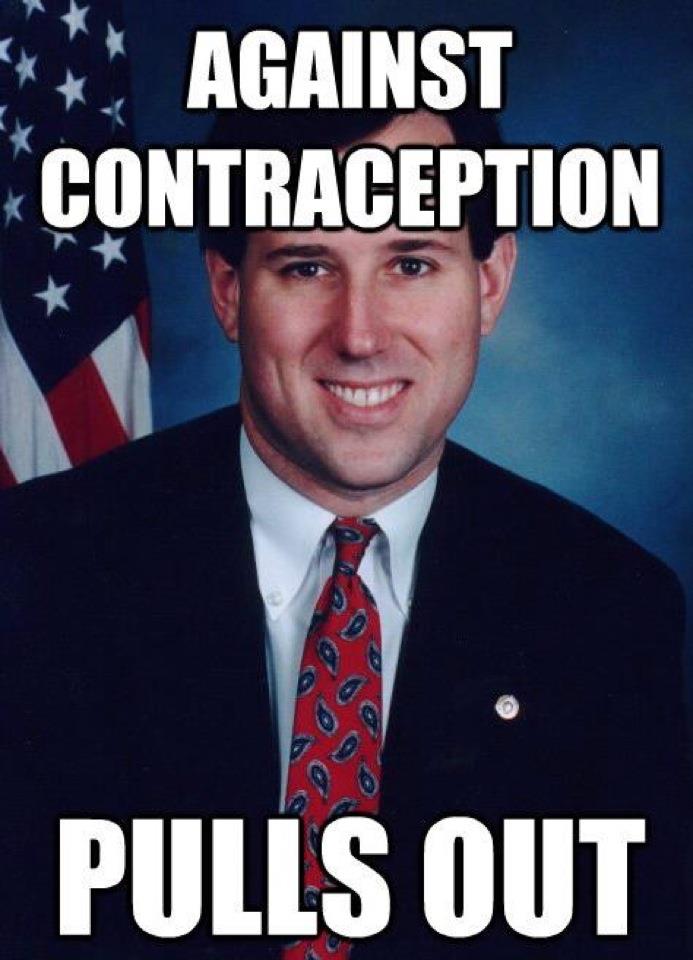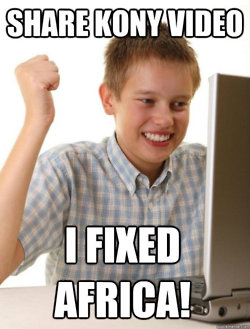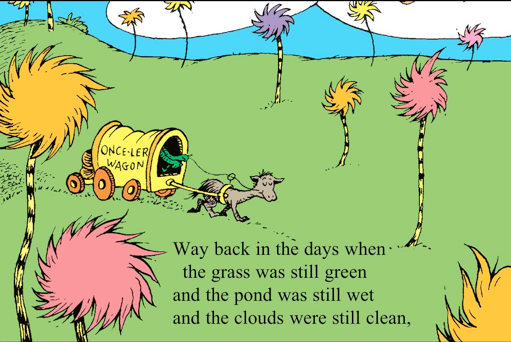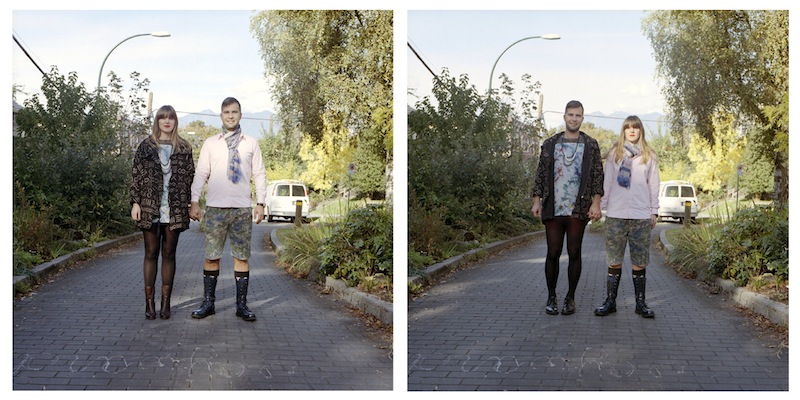I am not sure how I feel that Santorum has dropped out of the race for President. On one hand, of course, I am glad because there was such a severe divide between his political philosophy and my own. On the other hand, however, part of me was hoping he would be the Republican candidate because I felt Obama would have a much easier time beating him than the rest of the Republican alternatives. This notion provided me with some comfort. But now I am not sure exactly who to root for. I saw this hilarious photo and I had to share (A lot of the reasons I had problems with Santorum stemmed from his anti-LGBT mentality and also from his puritanical views on contraception):

At the end of the day (and I find it extremely hard to do this) I need to remember that politicians, no matter how much I disagree with their opinions, are people. And I shouldn’t hate people. Even people like Rick Santorum. It is, ultimately, his philosophy and political/social views that I hate. So on that note, I wish him and his family the best. And I hope his little girl gets better.
Although this is probably a huge waste of my energy, it really, really rubs me the wrong way that Google and Facebook are slowly but surely beginning to monopolize the internet. Not that I am, by any means, emotionally attached to internet applications (although I am to some), I think it is incredibly frustrating that these two corporations feel the need to snatch up all of these innovative applications. No one likes a monopoly. And the way I see it we are living in an age, not only of information and technology, but of subsequent monopolies of these domains. Since the beginning, the internet has effectively symbolized the notion of a free market in its purest form, and healthy competition is undeniably a critical part of this reality. However, the fact that the internet is starting to look like some twisted version of a monopoly game is really starting to rub me the wrong way. Essentially all of the major ‘sections’ of the internet are dominated and controlled by one, overpowering company. The two that first come to my mind are Google and, more recently, Facebook.
Today, Facebook bought Instagram, an incredibly popular photo-sharing device for mobile phones, which marks Facebook’s largest acquisition to date. Now, is it just me that has a problem with this? I have to say that it is becoming pretty difficult to deny the fact that we are in fact living in an age of information monopolies. What I wonder is: is it possible that we (North Americans, specifically) actually like and support these monopolies? We live in a very diverse society that is very much centred around the individual, how could it be possible that societies with such an individualistic, entrepreneurial spirit can allow themselves to be monopolized like this? Obviously, this is in the realm of the internet, but that does not mean that it is not controlling us, as the vast majority of the population uses the internet daily. I guess what I am getting at is that this does not seem like the most democratic way to go about things. Why has monopoly become the rule and rendered competition as a mere exception?
In the case of Instagram, Facebook has claimed that they are going to work together with the company to make improvements and bring it to more people. However, back in 2011 this did not seem very appealing to the owners of Instagram:
Facebook has been interested in Instagram for some time. In early 2011, Mr. Zuckerberg reached out to Instagram to discuss possibly purchasing the company, but Mr. Systrom chose to keep it independent and focus on expanding it, two Facebook engineers who asked not to be named said in August. At the time Instagram had less than 7 million users. (NY Times)
Today Instagram has close to 30 million users. Like I mentioned before, this particular example isn’t very personal for me. Recently, Google has acquired another online photo-editing program, Picnik and will be incorporating it into the Google+ interface. This is the same idea, once again. It isn’t necessarily that I feel strongly about Instagram’s independence, or Picnik’s independence for that matter, because it’s not that. It’s the principle behind it, and this, for me, is ultimately a matter of principle. One can argue that the internet may still be in a relatively benign phase of Internet monopolies’ rule. This may be true. But I think we all need to make closer evaluations of what exactly we are okay with. We need to stop viewing the internet as this distant, abstract, alternate universe. It is very much entrenched in our society and has become vital to our interactions and our means of accessing information. Facebook’s buying of Instagram just made me think, and thinking is something we all need to do more of. The idea of democracy and democratic rights apply to the internet just as much as ‘real life.’ Obviously, this kind of mentality is pretty evident in the recent scandals with SOPA and other anti-Internet censorship movements. But this should also apply to internet monopolies. Most of the repercussions are felt most strongly by internet entrepreneurs and private innovators. But ultimately we must realize that we as a society will begin to feel the consequences of these circumstances over the long run. The changes may be slow and subtle, but we are heading down a dangerous path. If this continues, we may soon find ourselves looking back at what once was a dynamic, innovative resource, teeming with opportunities, and see nothing more than a stagnant, syndicated black hole.


For me, the very first thing that comes to mind when anyone mentions “digital democracy” is online voting. More specifically, when I get to thinking about notions of digital democracies, a question immediately pops into my head: would this be a good idea?
It is easier, perhaps, for individuals living in the Western world to be inclined to say that online voting would be a great idea. After all, what better way to ‘cure’ voter apathy than to allow individuals to vote for their next leader in the comfort of their own home and at their leisure? Hell, they could even vote in their pajamas! How could this possibly not be a good thing?
The only problem is that this is based strictly on a very privileged way of thinking; one that assumes that individuals, across the board, have access to the internet or to a computer. In the U.S. and Canada and throughout much of Europe, this is a luxury that a considerable portion of the population can say that they have. However, throughout much of the rest of the world, this is not the case at all. In this sense it is obvious that online voting would not be a viable option in most parts of the world. It should come as no surprise that online voting would cause more marginalization; relegating those without access to certain types of technology to the fringe of society. Clearly most of the world is not ready for digital democracy, in terms of online voting. However, it is equally important to ask whether or not it is even a good idea for the countries that do in fact have the ability to begin implementing this kind of system.
I am by no means an expert in online voting. I have a general idea of what this would mean–in theory– but I have no idae how this would actually play out in practice, regardless of how widespread access to the internet was in a country. Ultimately, I think in theory, online voting could help seriously curb a lot of the problems that arise from voter apathy and pure laziness. It could be a brilliant attempt to fix a lot of the preexisting circumstances that lead to pathetic voter turnouts. However, it is important to remember that online voting, while possibly having very positive effects on voter turnout, will only have such effects on those with access to the internet. This means severe inequality and an imbalanced opportunity for citizens. Which brings us, essentially, back to square one. After all, democracy is for everyone, and online voting, clearly, is not. Back to the drawing board, I suppose.
While reading this article (which you should all read) I couldn’t help but think about the hypocrisy behind the Kony movement. Especially when I got to thinking about the treatment of African Americans and other (visible) minorities on our own continent. “it was only two weeks ago when almost every white person I knew was tweeting about stopping a brutal African warlord from killing more innocent children. And they even took thirty minutes out of their busy schedules to watch a movie about dude. They bought t-shirts. Some bracelets. Even tweeted at Rihanna to take a stance. But, a 17 year old American kid is followed and then ultimately killed by a neighborhood vigilante who happens to be carrying a semi-automatic weapon and my white friends are quiet. Eerily quiet. Not even a trending topic for the young man.” It is sometimes so easy for us to sweep these issues under the rug and pretend that racism no longer exists, but it is as real and pervasive as ever and the denial that surrounds it only works to further hinder widespread progress from being made. This doesn’t mean we should only care about ourselves and our own country, but this is something that needs to serve as a solemn reminder of just how very alive racism is. Perhaps in addition to spreading news of Joseph Kony in hopes of saving Africa, individuals should also strive to acknowledge and challenge the racism and discrimination that is undoubtedly very much alive in their own communities.
“So, I fight for Trayvon Martin. I fight for Amadou Diallo. I fight for Rodney King. I fight for every young black man who looks “suspicious” to someone who thinks they have the right to take away their freedom to walk through their own neighborhood. I fight against my own stereotypes and my own suspicions. I fight for people whose ancestors built this country, literally, and who are still treated like second class citizens. Being quiet is not an option, for we have been too quiet for too long.”

The Safe Streets and Communities Act fundamentally changes almost every component of Canada’s criminal justice system. It will:
- Increase penalties for sexual offences against children and create two new offences related to sexual exploitation of children;
- Increase the penalties for drug crimes including the imposition of a number of mandatory minimum sentences. Possession of six marijuana plants for the purposes of trafficking, for instance, would result in a mandatory six-month term;
- Keep violent and repeat young offenders off the streets while they are awaiting trial, require courts to consider adult sentences for youths convicted of the most serious crimes, and allow the publication of the names of violent young offenders;
- Prevent judges from imposing conditional sentences for crimes involving serious personal injury, crimes which carry a maximum prison term of 14 years or more, and some other specified offences;
- Enshrine a victim’s right to participate in parole hearings;
- Extend the ineligibility periods for “record suspensions,” previously known as pardons, to five years for summary conviction offences and to ten years for indictable offences;
- Give the Minister of Public Safety more leeway when deciding whether an offender convicted in another country will be granted a transfer back to Canada;
- Allow victims of terrorism to sue individuals, organizations and foreign states for loss or damage;
- Authorize immigration officers to refuse work permits to foreign nationals when it is determined that they are at risk of humiliating or degrading treatment. (The Globe and Mail)
Basically, in the simplest of terms, it is a very bad thing that I do not agree with. I think it has a lot of important issues in mind but it is not an adequate system and will not bring long-term change. Agreeing with Quebec, I see this bill as a “bandaid” solution that will ultimately bring more harm than good.
I leave you with The Canadian Bar Association’s list of 10 reasons to oppose this bill.
Since Joseph Kony took over the internet a few days ago, I have stumbled upon a number of blogs and websites that have given me a lot to think about in terms of Invisible Children and the organizers of the Kony 2012 movement. I do not want to make it seem as if I am a supporter of child soldiers. Because I absolutely am not. This is a very serious and important issue that needs international attention. This much I agree with. However, there a variety of things represented in this project that are a bit problematic. Firstly, the term ‘Invisible Children’ … what does this mean? Invisible to whom? Do these children only become legitimate, “visible,” once they are acknowledged by Westerners? This I have a problem with. The situation insinuated by this name suggests a western-centric power dynamic that does not sit well with me. This entire video is perpetuating the notion of the Western saviour which to a certain extent is hard to escape, but the way that it is represented, both in the film and in the rhetoric surrounding this project, makes me a bit uneasy.
I don’t want to suggest that this cause is illegitimate because it is not. However it is important that we educate ourselves on the issue, outside of what the video and Kony 2012 suggest. Kony 2012 is only one way of approaching a huge web of related issues. Kony is only one man. This has been going on for years and it is not just one person who is responsible. While it is undoubtedly significant that we do all we can to remove Kony and bring some justice to the children and families that have been directly affected by the atrocities he has orchestrated, Kony and his actions are only the tip of the ice burg. There are atrocities being committed every minute of every day around the world, and the majority of us in the Western world live our lives in complete denial that it is even happening. We are citizens of the world. Our accountability is not only to members of our own nation, or own race, or those who share the same beliefs of us. It is to everyone. Every single individual with whom we share our Earth.
Below are some sites that offer interesting opinions. You don’t have to agree with all of it, or any of it for that matter. But there are so many other factors involved and people ought to educate themselves more before throwing themselves on a bandwagon supporting something they are not fully knowledgeable about. I find it so hypocritical that people think they can excuse years of apathy and inaction just by sharing a video on YouTube. If you really want to help make a difference, you need to involve yourself more than that. You may have to, god forbid, leave your house and your computer and do something. In the meantime, I suppose viral spread of the video is better than nothing. But activism is and must be much more than that.
Terrible things are happening, in Africa and all around the world. But before you blindly join the Kony 2012 movement, educate yourself on other circumstances that surround this cause. And don’t stop asking questions.
http://innovateafrica.tumblr.com/post/18897981642/you-dont-have-my-vote
http://blogs.independent.co.uk/2012/03/07/stop-kony-yes-but-dont-stop-asking-questions/
http://tumblr.thedailywh.at/post/18909727859/on-kony-2012-i-honestly-wanted-to-stay-as-far
http://visiblechildren.tumblr.com/

1) The National Review has a blog called ‘The Corner‘ and I had already read several posts before I even realized I was reading them. What I mean by this is, I found the posts not only extremely accessible but just easy to read in general. The blog covers a large variety of topics and I found their writing style to be straightforward and fair. Obviously any writing will have a certain amount of biases attached to it, that is inescapable. But I found the posts on The Corner informative and entertaining and I really enjoyed reading the posts I read. I have added it to my bookmarks for future reference.
2) For me, the writing style of a blog makes a lot of difference. But that doesn’t mean that I can disregard what is being said even if it is written in the most eloquent of ways. For this reason, far right American blogs are just horrifying to me and I had to pick one of these as an example of a blog that I would never look at willingly (or maybe I would but probably only to ‘educate’ myself on what the other side is saying). Bill O’Reilly is not only one of my least favourite people on the planet but he is also not a very convincing, intriguing or otherwise good blogger (Behold: Bill O’Reilly’s Blog). So for this assignment I tried to set aside my strong dislike of Bill and simply critique the writing style. Overall I found it to be somewhat informative but I couldn’t help but sense a strong degree of entitlement and my somewhat short attention span was not having it.
Writing style is integral to a successful blog. A well-rounded, successful political blog is a difficult combination of fair reporting, accessible writing, and careful word choice. In addition to this, the personality of the writer/blogger can often times be easy to detect from a good blog post. For this reason, it is easy to separate which blogs one might read and might steer clear based on partisanship that may not even be explicit. For me, I read political blogs that cater to my interests and political concerns and tend to be left-leaning, but if it’s not well-written and doesn’t hold my attention, I will find my news elsewhere.

I’m going to see the Lorax this week (see trailer here) and I am really looking forward to it. I think the ability for the film industry to produce a movie that is appealing and accessible to today’s youth while also addressing significant environmental and social issues is incredibly admirable. The movie, based on Dr. Suess’ children’s book with the same title, addresses the ways in which contemporary industrialized society continuously neglects the environment. I am very excited to see this ‘cautionary tale.’ We all need to play an active participatory role in taking care of the environment. It is so easy to forget little things that collectively make a huge difference. That one extra moment that it takes to toss a can into the recycling rather than into the garbage. Or buying a reusable bag to go grocery shopping with. Or a tumbler for coffee or a glass water bottle. Everyone, no matter their age, should heed the Lorax’s warning: if we do not collectively take responsibility for our environment and be careful to resist being further sucked in by commercialism at expense of nature, we will slowly but surely destroy our beautiful world.









